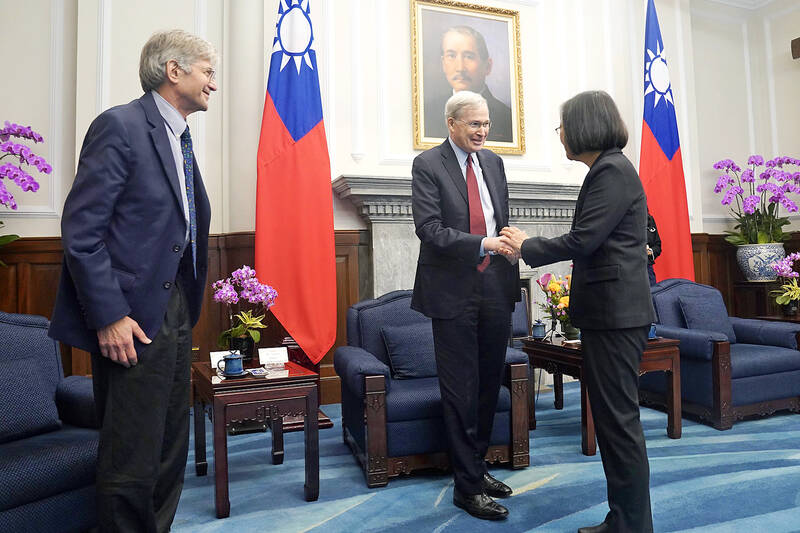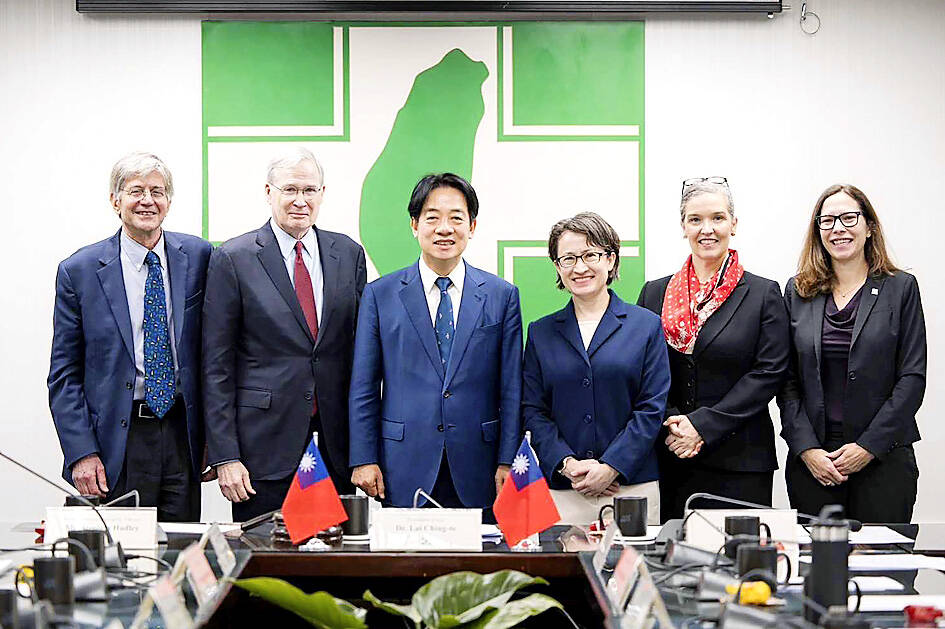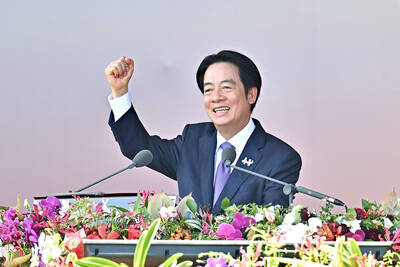Visiting former US officials yesterday reaffirmed the US’ rock-solid commitment to Taiwan, saying that the US is to keep working with Taiwan for peace and stability across the Taiwan Strait.
Former US national security adviser Stephen Hadley made the remarks during a meeting with President Tsai Ing-wen (蔡英文) at the Presidential Office in Taipei.
Hadley and former US deputy secretary of state James Steinberg arrived in Taiwan on Sunday for a post-election visit in a private capacity, the American Institute in Taiwan said.

Photo: CNA
Hadley conveyed congratulations to Tsai and Taiwanese on the smooth completion of the nation’s presidential and legislative elections on Saturday.
Taiwan’s democracy has set a shining example for the world and is a democratic success story based on transparency, rule of law, respect for human rights and freedom, he said.
The US’ commitment to Taiwan is rock-solid, principled and bipartisan, he said, adding that “the US would stand with its friend.”

Photo: Democratic Progressive Party via AP
Hadley said that he looked forward to seeing Taiwan and the US continue to deepen their relations to jointly safeguard peace and stability in the Taiwan Strait under the new government.
Steinberg said that Tsai’s leadership in the past eight years has been admirable, as it has benefited Taiwanese, significantly advanced the partnership between Taiwan and the US, and contributed to regional peace and stability.
The US’ Taiwan policy has remained consistent for a long time, supporting the informal but friendly relations between the two sides, he said.
The US maintains that cross-strait issues should be resolved through peaceful means and that any unilateral change to the “status quo” should be avoided, he said, adding that the approach is in the interest of all regional parties.
Tsai thanked the delegation for demonstrating the US’ support for Taiwan’s democracy through their visit, adding that she hoped to see Taiwan-US relations continue to deepen and become an important driving force for regional and global prosperity and development.
The delegation later yesterday met with president-elect William Lai (賴清德) and vice president-elect Hsiao Bi-khim (蕭美琴) at Democratic Progressive Party headquarters in Taipei.
Lai said that “democracy and freedom are the most valuable assets of the Taiwanese people,” as well as core values shared by Taiwan and the US, and the foundation of the stable relations between the two sides.
Sending congratulatory messages to him and Hsiao right after the elections on Saturday and a delegation of senior US representatives to Taiwan is “hugely meaningful” to the nation, as it shows firm support for Taiwan’s democracy and demonstrates close Taiwan-US ties, Lai said.
He vowed to lead Taiwan on the foundations laid by Tsai, safeguarding peace and stability in the Taiwan Strait.
Leading up to the inauguration ceremony in May, the government would continue to provide a solid foundation for the new government to take over seamlessly, he said.
Meanwhile, Japanese Chief Cabinet Secretary Yoshimasa Hayashi yesterday said that Taiwan is an important friend of Japan and vowed to deepen Japan-Taiwan ties.
“Taiwan is an extremely important partner and dear friend of our country, with whom we share fundamental values and have close economic ties and people-to-people exchanges,” Hayashi told a news conference.
Japan is to maintain its “working relationship on a non-governmental basis” with Taiwan while striving to further deepen cooperation and exchanges between the two sides, he said.
The Japanese government has long maintained that cross-strait disputes should be resolved through dialogue and peaceful means, and calls for regional peace and stability, he added.

The Ministry of the Interior (MOI) is to tighten rules for candidates running for public office, requiring them to declare that they do not hold a Chinese household registration or passport, and that they possess no other foreign citizenship. The requirement was set out in a draft amendment to the Enforcement Rules of the Public Officials Election and Recall Act (公職人員選舉罷免法 ) released by the ministry on Thursday. Under the proposal, candidates would need to make the declaration when submitting their registration forms, which would be published in the official election bulletin. The move follows the removal of several elected officials who were

FOUR DESIGNATED AREAS: Notices were issued for live-fire exercises in waters south and northwest of Penghu, northeast of Keelung and west of Kaohsiung, they said The military is planning three major annual exercises across the army, navy and air force this month, with the navy’s “Hai Chiang” (海強, “Sea Strong”) drills running from today through Thursday, the Ministry of National Defense said yesterday. The Hai Chiang exercise, which is to take place in waters surrounding Taiwan, would feature P-3C Orion maritime patrol aircraft and S-70C anti-submarine helicopters, the ministry said, adding that the drills aim to bolster the nation’s offshore defensive capabilities. China has intensified military and psychological pressure against Taiwan, repeatedly sending warplanes and vessels into areas near the nation’s air defense identification zone and across

SENATE RECOMMENDATION: The National Defense Authorization Act encourages the US secretary of defense to invite Taiwan’s navy to participate in the exercises in Hawaii The US Senate on Thursday last week passed the National Defense Authorization Act (NDAA) for Fiscal Year 2026, which strongly encourages the US secretary of defense to invite Taiwan’s naval forces to participate in the Rim of the Pacific (RIMPAC) exercise, as well as allocating military aid of US$1 billion for Taiwan. The bill, which authorizes appropriations for the military activities of the US Department of Defense, military construction and other purposes, passed with 77 votes in support and 20 against. While the NDAA authorizes about US$925 billion of defense spending, the Central News Agency yesterday reported that an aide of US

NATIONAL DAY: The ‘Taiwan Dome’ would form the centerpiece of new efforts to bolster air defense and be modeled after Israel’s ‘Iron Dome,’ sources said President William Lai (賴清德) yesterday pledged to strengthen the nation’s air defense capabilities and build a “T-Dome” system to create a safety net against growing military threats from China. “We will accelerate our building of the T-Dome, establish a rigorous air defense system in Taiwan with multi-layered defense, high-level detection and effective interception, and weave a safety net for Taiwan to protect the lives and property of citizens,” he said in his National Day address. In his keynote address marking the Republic of China’s (ROC) 114th anniversary, Lai said the lessons of World War II have taught nations worldwide “to ensure that